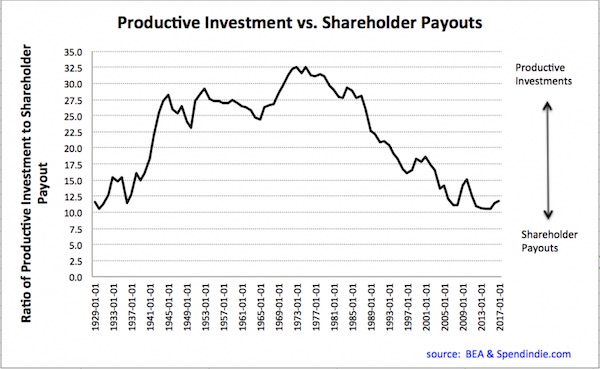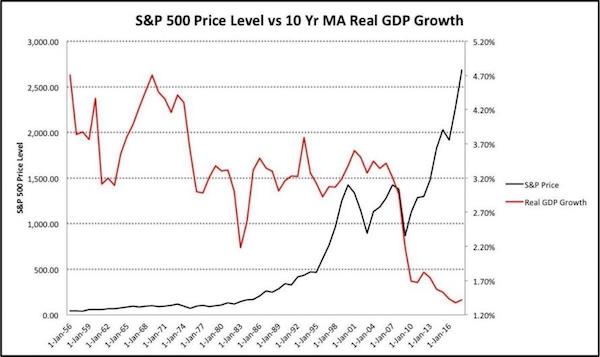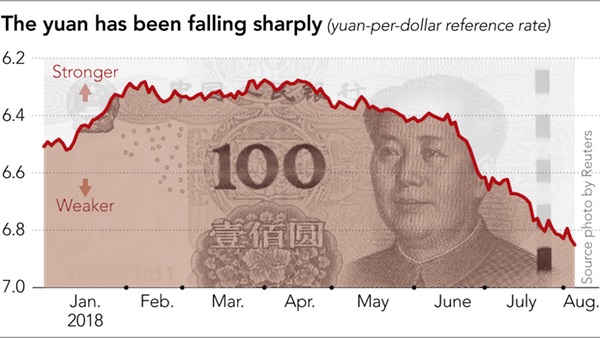
John French Sloan Sunset, West Twenty-Third Street 1905-6

Apple does record buybacks. Amazon invests in becoming a better company.
Hadn’t heard from Thad Beversdorf for quite a while. Good to see you, my friend!
• The Myth Of Market Cap (Berversdorf)
Why do CEO’s distribute cash to secondary market speculators? These speculators haven’t provided any capital to the balance sheet and haven’t added to the income statement or cash flow statement of the companies they are speculating on. So why do CEO’s spend so much effort and capital appeasing them? Market cap is the benchmark by which a company distributes cash (i.e. div yield). But market cap, as determined in the secondary markets, is a theoretical asset that doesn’t generate revenue, profit or cash flow for the firm. Meaning cash payments are tied to an ‘asset’ that has no relevance to a firm’s operations. Paying dividends against an non-producing asset i.e. market cap that generates no return for the company is incredibly destructive.
There becomes a dangerous disconnect between the return on capital the company raised/invested and the cash distribution. In this sense, market cap is a massive hindrance to the firm’s capacity for productive investment as capital is eaten up paying out against an asset that hasn’t generated any return. The destructive force of this connect is exacerbated by the stock buy backs whose sole purpose is to drive market cap higher. And for what benefit? What does a higher market cap or a higher valuation do to improve the operation and long term success of the business? Historically market cap was a represenation of operational performance and expected future growth but it has now become the objective. Apple’s numbers are mediocre. But they are distributing $110 billion in cash this year so it doesn’t matter.
They hit a trillion dollar market cap. That puts its price-to-sales in line with Amazon, which has a 3 year revenue growth rate 7x higher than Apple’s (32% vs. 4.5%). Amazon’s growth rate continues to accelerate while Apple actually lost overall marketshare dropping from second largest to the third largest seller of smartphones, something that hasn’t ever happened. And so why would a firm that is losing marketshare not be putting its capital to work? The proof is in the pudding. Amazon doesn’t distribute cash to speculators. It attracts speculators by driving expected future growth. The rest of the market is attracting speculators by paying them cash. In effect, CEO’s are investing in market cap today rather than growth tomorrow. The result is that Amazon is in a league of its own, trouncing incumbants in any sector it enters because it invests in being better.

The moral of the story is that when market cap becomes the objective of capital rather than a representation of productive capital allocation, productive investment is replaced with financial investment. When market cap is being driven by something other than expected future growth derived from productive investment it is coming at the cost of expected future growth due to lack of productive investment. Read that again.


The netire region depends on China to a huge degree.
• The Looming Threat of a Yuan Depreciation (Magnus)
When the Asian financial crisis occurred 20 years ago, many nations in East and Southeast Asia succumbed because they were following inconsistent domestic and international economic and financial policies. But one trigger was the 50% fall in the Japanese yen against the dollar between the end of 1995 and the summer of 1998 amid the American stock market’s bull run that lasted until 2002. Fast forward to today, and the dollar is on a roll again, thanks to a strong economy and tensions between its fiscal and monetary policies. Higher U.S. interest rates and a stronger dollar are already raising debt interest costs for Asian borrowers, but this time the falling Chinese yuan looms as a proximate cause of trouble.
Asia’s vulnerability to developments in U.S. financial markets has been widely noted. It is true that unlike the Asian financial crisis of 1997-1998, most countries in the region have stronger foreign exchange reserves. They are better positioned when measured against important indicators such as months of import cover, short-term debt and foreign debt ratios. Most Asian countries have current account surpluses, and even those with deficits, such as India, Indonesia, Myanmar and the Philippines do not look overly challenged. But while the sensitivity to shocks is lower than it was 20 years ago, there is no cause for complacency. And there is still a potential spoiler, the yuan, which is now under downward pressure, but which was an agent of calm in the last Asian crisis.


The US wants access to Russian facilities. Sure. They’re going to see OK, if we get access to yours.
• Russia Blasts New US Sanctions As ‘Theatre Of The Absurd’ (G.)
Russian officials reacted with outrage and markets slumped on Thursday morning following the announcement of tough new US sanctions over Russia’s alleged use of a nerve agent in the Salisbury attack. President Vladimir Putin’s spokesman, Dmitry Peskov, said the sanctions were “absolutely unlawful and don’t conform to international law”, as politicians vowed to respond with countermeasures, which could include bans on the exports of rockets or resources for manufacturing. “The theatre of the absurd continues,” tweeted Dmitry Polyanskiy, first deputy permanent representative of Russia to the UN. “No proofs, no clues, no logic, no presumption of innocence, just highly-likelies. Only one rule: blame everything on Russia, no matter how absurd and fake it is. Let us welcome the United Sanctions of America!”
A member of the Duma’s foreign affairs committee, Leonid Slutsky, said Russia could block exports of RD-180 rocket engines to the US as a potential countermeasure, the RIA Novosti news agency reported. The United States announced on Wednesday that it would impose restrictions on the export of sensitive technology to Russia because of its use of a nerve agent in the attempted murder of a former Russian spy and his daughter in Britain. The State Department said the new sanctions would come into effect on 22 August and would be followed by much more sweeping measures, such as suspending diplomatic relations and revoking Aeroflot landing rights, if Russia did not take “remedial” action within 90 days.
Moscow is not expected to agree to the response required by US legislation, which includes opening up Russian scientific and security facilities to international inspections to assess whether it is producing chemical and biological weapons in violation of international law.

Russia is losing patience.
• US Curbs On Russian Banks Would Be Act Of Economic War – Medvedev (R.)
Russia would consider any U.S. move to curb the operations of Russian banks or their foreign currency dealings a declaration of economic war, Prime Minister Dmitry Medvedev said on Friday. The United States announced a new round of sanctions on Wednesday targeting Russia that pushed the rouble to two-year lows and sparked a wider sell-off over fears Russia was locked in a spiral of never-ending sanctions. Separate legislation introduced last week in draft form by Republican and Democratic senators proposes curbs on the operations of several state-owned Russian banks in the United States and restrictions on their use of the dollar.
Medvedev said Moscow would take economic, political or other retaliatory measures against the United States if Washington targeted Russian banks. “I would not like to comment on talks about future sanctions, but I can say one thing: If some ban on banks’ operations or on their use of one or another currency follows, it would be possible to clearly call it a declaration of economic war,” said Medvedev. “And it would be necessary, it would be needed to react to this war economically, politically, or, if needed, by other means. And our American friends need to understand this,” he said, speaking on a trip to the Russian Far East.

Someday people will recognize how well Russia is coping with all the nonsense.
• US Must Turn to Russia to Contain China (Rickards)
Vladimir Putin stands accused in the media and global public opinion of rigging his recent reelection, imprisoning his political enemies, murdering Russian spies turned double-agent, meddling in Western elections, seizing Crimea, destabilizing Ukraine, supporting a murderous dictator in Syria and exporting arms to terrorist nations like Iran. At the same time, the country of Russia is more than Mr. Putin, despite his authoritarian and heavy-handed methods. Russia is the world’s 12th-largest economy, with a GDP in excess of $1.5 trillion, larger than many developed economies such as Australia (No. 13), Spain (No. 14) and the Netherlands (No. 18). Its export sector produces a positive balance of trade for Russia, currently running at over $16 billion per month.
Russia has not had a trade deficit in over 20 years. Russia is also the world’s largest oil producer, with output of 10.6 million barrels per day, larger than both Saudi Arabia and the United States. Russia has the largest landmass of any country in the world and a population of 144 million people, the ninth largest of any country. Russia is also the third-largest gold-producing nation in the world, with total production of 250 tons per year, about 8% of total global output and solidly ahead of the U.S., Canada and South Africa. Russia is highly competitive in the export of nuclear power plants, advanced weaponry, space technology, agricultural products and it has an educated workforce.
Russia’s government debt-to-GDP ratio is 12.6%, which is trivial compared with 253% for Japan, 105% for the United States and 68% for Germany. Russia’s external dollar-denominated debt is also quite low compared with the huge dollar-debt burdens of other emerging-market economies such as Turkey, Indonesia and China. Under the steady leadership of central bank head Elvira Nabiullina, the Central Bank of Russia has rebuilt its hard currency reserves after those reserves were severely depleted in 2015 following the collapse in oil prices that began in 2014. Total gold reserves rose from 1,275 tons in July 2015 to about 2,000 tons today. Russia’s gold-to-GDP ratio is the highest in the world and more than double those of the U.S. and China.
In short, Russia is a country to be reckoned with despite the intense dislike for its leader from Western powers. It can be disliked but it cannot be ignored. Russia is even more important geopolitically than these favorable metrics suggest. Russia and the U.S. are likely to improve relations and move closer together despite the current animosity over election meddling and the attempted murders of ex-Russian spies. The reason for this coming thaw has to do with the dynamics of global geopolitics. There are only three countries in the world that are rightly regarded as primary powers — the U.S., Russia and China. These three are the only superpowers. Some analysts may be surprised to see Russia on the superpower list, but the facts are indisputable.

China exports the Silk Road. And creates dependencies that way.
• Pakistan Is On The Brink Of Economic Disaster (CNBC)
Pakistan is on the brink of economic disaster, experts say. Foreign exchange reserves are at four-year lows, pressuring the local rupee and triggering worries that Islamabad may soon be unable to finance monthly import bills. The developing country is also awash in external debt, having taken on loans from China for the $62 billion China-Pakistan Economic Corridor. To avoid a full-blown balance of payments crisis, Islamabad needs outside help. It has two options: the IMF or Beijing. Neither, however, may solve its economic woes in the long run. The South Asian nation is no stranger to IMF bailouts — it has gone through 21 programs in total, with the most recent one ending two years ago.
If the administration of incoming Prime Minister Imran Khan seeks out another loan, estimated at $10 billion, the country will be subject to the IMF’s strict austerity measures that’re likely to hurt growth. It also wouldn’t bode well politically for Khan, who called on the campaign trail for Pakistan to become self-sufficient. The U.S., meanwhile, has taken issue with the idea of IMF funds going toward Pakistan’s Chinese debt obligations. “There’s no rationale for IMF tax dollars — and associated with that, American dollars that are part of the IMF funding — for those to go to bail out Chinese bondholders or China itself,” Secretary of State Mike Pompeo told CNBC last week.
In response, Pakistan’s finance ministry has refuted Pompeo’s linkage of IMF assistance with the China-Pakistan Economic Corridor. Alternatively, Khan’s government could turn to China for fresh loans. But that would mean Islamabad wading even deeper into the so-called “Chinese debt trap” — a frequent criticism of Beijing’s infrastructure spending spree that’s known as the Belt and Road Initiative, of which the CPEC is a part. Last month, the Asian giant loaned Pakistan $1 billion to boost its shrinking foreign currency reserves. For the current fiscal year thus far, China’s lending to Pakistan is set to exceed $5 billion, according to Reuters.

They’ve never seen an actual plan.
• Tesla Board Plans To Tell Elon Musk To Recuse Himself (CNBC)
The Tesla board of directors plans to meet with financial advisors next week to formalize a process to explore Elon Musk’s take-private proposal, according to people familiar with the matter. Musk announced via Twitter this week that he hopes to take the automaker private, in what would be one of the biggest such deals in history. The board is likely to tell Musk, the Tesla chairman and CEO, to recuse himself as the company prepares to review his take-private proposal, according to these people, who asked not to be named because the conversations are private. The board has told Musk that he needs his own separate set of advisors, one of the people said. Tesla’s board will likely develop a special committee of a smaller number of independent directors to review the buyout details, the people added.
Musk previously talked with Saudi Arabia’s sovereign wealth fund about a take-private deal, said one of the people. Saudi’s Public Investment Fund bought a 3% to 5% stake in the electric car maker, The Financial Times reported earlier this week. It isn’t yet known whether Saudi’s Public Investment Fund has agreed to commit money to the transaction. It also still isn’t clear if Tesla has committed financing. Musk tweeted he had “funding secured” on Tuesday when he said he was considering taking the company private at $420 per share. Tesla has declined to comment on funding for the transaction, leading to speculation Musk doesn’t have committed financing and drawing a request for more information from the SEC.

US involvement in Nordstream 2?
• US, EU Laying Groundwork For New Trade Deal (CNBC)
Two weeks after reaching a handshake agreement to calm trade talks and back off new tariffs, the United States and European Union are beginning to lay the formal groundwork underpinning any deal. On Tuesday, the State Department sent a cable to U.S. embassies across Europe, directing them to identify business areas ripe for lowering of tariffs or cutting of red tape, according to a readout of the cable provided to CNBC. The communication placed particular emphasis on deals that would increase U.S. energy and soybean exports, two areas highlighted in a joint statement the U.S. and the EU put out following the July 25 meeting.
One of the ideas that had been discussed is potential American involvement in a Russian natural gas pipeline into Germany that President Donald Trump had criticized. European Commission President Jean-Claude Juncker told Trump at the White House last month that “most” EU countries disagreed with German Chancellor Angela Merkel’s decision to broker the deal with Russia, according to a senior administration official. The State Department declined to comment, citing a policy not to confirm or deny internal communications. But the move represents an effort to source deliverables for talks set to take place when a delegation from the European Union visits Washington later this month.

It’s a good idea to hold Sessions in contempt. But he’s the AG!.
• US Judge Orders Deportation Plane Turnaround (BBC)
A federal judge has ordered a mother and her daughter be flown back to the United States, after learning they had been deported mid-appeal. The two were being represented in a lawsuit by the American Civil Liberties Union (ACLU), who said they had fled “extreme sexual and gang violence”. The judge said it was unacceptable they had been removed during their appeal. He reportedly also said Attorney General Jeff Sessions could be held in contempt of court for the deportation. The mother and daughter were part of a case filed by the ACLU and the Centre for Gender and Refugee Studies on behalf of 12 mothers and children who said they had fled violence, but were at risk of deportation.
A tightening of rules in June by Mr Sessions means victims of domestic abuse and gang violence no longer generally qualify for US asylum. The government had pledged not to deport anyone in the case before Friday at the earliest, ACLU said. But ACLU said they learned during Thursday’s emergency hearing that the mother and daughter had already been put on a flight back to El Salvador by US authorities. Washington DC District Court Judge Emmet Sullivan said that it was unacceptable that people claiming asylum had been removed while lawyers argued their case. He branded the situation “outrageous” and ordered the pair be returned immediately, according to reports. An official from the Department of Homeland Security told the Reuters agency that the agency worked to comply with the court’s order.
“Upon arrival in El Salvador, the plaintiffs did not disembark and are currently en route back to the United States,” the department said in an emailed statement. The mother and daughter are said to have arrived back in Texas, where they were being held, by Thursday night.

It’s a market place. Supply and demand.
• Germany Inks Deal With Spain To Return Registered Migrants (AFP)
Berlin has concluded a deal with Madrid for Spain to take back migrants who had been registered by Spanish authorities, a German interior ministry spokeswoman said Wednesday, as Germany seeks to curb new arrivals. Under the accord, which will enter in to force on Saturday August 11, the migrants “could be sent back to Spain within 48 hours,” said interior ministry spokeswoman Eleonore Petermann, adding that Madrid did not lay down any condition in exchange. The deal is part of a series of bilateral agreements that Germany is seeking with EU partners, after a broader accord for the bloc proved elusive.
Chancellor Angela Merkel has been under pressure to reduce the number of new arrivals after a record influx of a million asylum seekers between 2015 and 2016 unsettled Germany. Besides Spain, Greece – another key arrival country for migrants who had undertaken the perilous sea journey crossing the Mediterranean – has also in principle agreed to such a deal, Berlin said in June. Italy’s new right-wing government has been more reluctant, as it is putting its focus on boosting controls at the EU’s external borders. Discussions with both Athens and Rome are “not over,” said Petermann. But Interior Minister Horst Seehofer had said in an interview published Sunday that talks with his Italian and Greek colleagues were ongoing “in a good atmosphere”.

“10 million plastic bags per minute.”
• New Zealand To Ban Single-Use Plastic Bags (AFP)
New Zealand became the latest country Friday to outlaw single-use plastic shopping bags, with Prime Minister Jacinda Ardern saying they will be phased out over the next year as a “meaningful step” towards reducing pollution. New Zealand uses “hundreds of millions” of single-use plastic bags each year, many of which end up harming marine life, Ardern said. “We need to be far smarter in the way we manage waste and this is a good start,” she said. “We’re phasing-out single-use plastic bags so we can better look after our environment and safeguard New Zealand’s clean, green reputation.”
Ardern said her coalition government, which includes the Green Party, was facing up to environmental challenges and “just like climate change, we’re taking meaningful steps to reduce plastics pollution so we don’t pass this problem to future generations.” Single-use plastic bags are among the most common items found in coastal litter in New Zealand and the environmental group Greenpeace welcomed the decision to outlaw them. “This could be a major leap forward in turning the tide on ocean plastic pollution and an important first step in protecting marine life such as sea turtles and whales, from the growing plastic waste epidemic,” Greenpeace Oceans Campaigner Emily Hunter said. A United Nations report in June said up to five trillion grocery bags are used globally each year, which is nearly 10 million plastic bags per minute.








